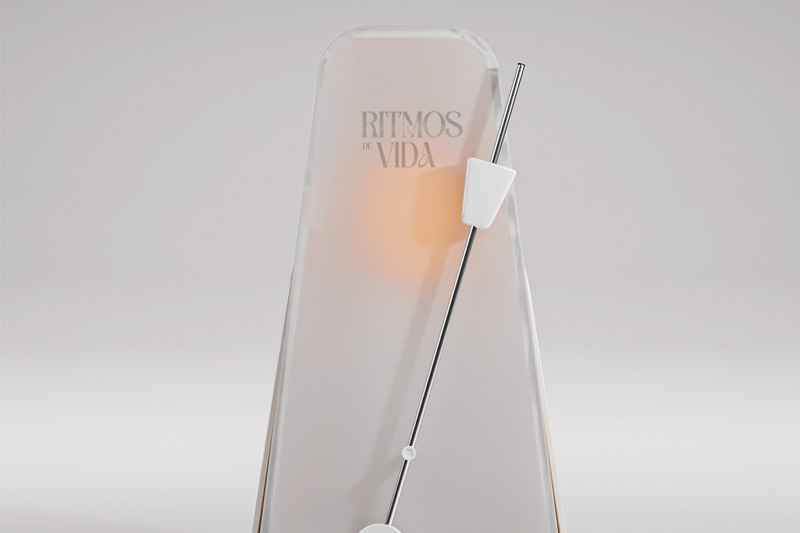- “Ritmos de Vida” is endorsed by the professionals of the group’s Heart Department and features musicians, some of whom are healthcare professionals, who have recorded compositions to the “rhythm” of this unique metronome, made by Ribera from the heartbeat of Adrián, a patient with cardiovascular disease.
- The initiative was presented today at the University Hospital of Torrejón with two round tables to talk to specialists about heart care at all stages of life and the health benefits of music.
The Ribera healthcare group today presented the “Rhythms of Life” campaign, in which health and music go hand in hand to raise awareness of cardiovascular diseases and associated risk factors, with a singular and unique element: the first ever arrhythmic metronome.
Ribera has promoted the construction of a very special metronome, which swings to the “rhythm” of a sick heart, specifically the heart of Adrián, a patient with arrhythmia, and which is the focus of all the initiatives linked to this health awareness and education action: a travelling exhibition of the unique metronome, which will tour all the group’s hospitals; musical compositions recorded to the rhythm of the heart, awareness days with patients and healthy advice on how to look after the heart, among others.
Ribera has worked on this initiative with Maart Agency, responsible for the creative idea, and with Estudio Espadaysantacruz, manufacturer of the personalised arrhythmic metronome. The core of the campaign is that both the heartbeat and the “tempo” of compositions in music are measured in the same way, in beats per minute (BPM). That is why this “special” metronome has been produced: it is the means by which musicians measure the tempo.
This afternoon, the University Hospital of Torrejón hosted the launch of “Rhythms of Life”, endorsed by the professionals of the Heart Area of the healthcare group, and also by prestigious national and international cardiologists, who took part in the event, which was also attended by representatives of institutions, patient associations and professionals. The presentation began with two round tables to discuss heart care at all stages of life and the health benefits of music, with the participation of several health professionals who are also musicians. The first round table was moderated by the president of New Medical Economics, Dr. José María Martínez, with the participation of Dr. Alfonso Valle, head of the Cardiology Service of the Hospital de Denia; Carlos de Diego, head of the Cardiology Service of the Hospital Universitario del Vinalopó; and Óscar Salvador, cardiologist of the Hospital Universitario de Torrejón. The second round table, moderated by Dr. Vicente Roig, coordinator of the Heart Area of the Ribera Group, began with a talk by Dr. David Alter, senior scientist at the Institute for Clinical Evaluative Science (ICES) in Toronto, Canada, with the participation of Dr. Javier Viñas, cardiologist at the Hospital de Cuenca, and Dr. José Mallent, surgeon specialising in Plastic, Cosmetic and Reconstructive Surgery. All of them are also musicians.
Afterwards, the hall of Torrejón Hospital became a stage for a live musical performance by the vocalist of The Heart Swinger, Dr. Javier Viñas, together with Manuel Murgui, pianist; and Esperanza Fernández de Mesa, Councillor for Health of Torrejón de Ardoz City Council, inaugurated the first of the travelling exhibitions of the metronome in this health centre, accompanied by Alberto de Rosa and Elisa Tarazona, President and CEO of Ribera. The exhibition will tour the rest of the group’s hospitals in the coming months.
A campaign beyond Ribera
The aim of “Ritmos de Vida” is to raise awareness of cardiovascular problems in order to help prevent them. For this reason, the initiatives included in the campaign are open to all health centres, beyond Ribera’s own: the exhibition of the unique metronome will be able to travel to different places, and the web and social networks will share the compositions created by musicians from different backgrounds, to the rhythm of Adrián’s heart.
Cardiovascular diseases are currently the leading cause of death in the world. More than 17 million people die each year from heart disease and it is estimated that by 2030 there will be 23 million. Specifically in Spain, 250 people die every day from heart disease. That is why those in charge of the Heart Area of the Ribera group, the cardiovascular network of inter-hospital collaboration made up of professionals from the Vinalopó and Torrejón university hospitals, the Denia hospital and the Ribera Povisa hospital, consider actions related to prevention, education and health care to be of particular importance in order to tackle the risk factors of cardiovascular diseases and detect any anomaly in this organ-system in time. Video “Rhythms of Life”, here.


Recent Comments